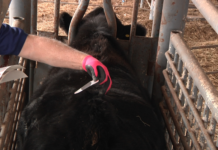By: Nqobile Bhepe, Zimbabwe,Bulawayo
An ambitious programme aimed at boosting Zimbabwe’s national herd is set to be launched in the predominant cattle ranching provinces of Matabeleland South and North.
Farmer organization say Zimbabwe currently has a national cattle herd of 5,3 million, down from nearly six million cattle in 1996.
Government is frequently called on to avail funds to support the revival of the sector.
Matabeleland South is traditionally the backbone of the country’s cattle herd but livestock production is on a decline largely due to persistent drought as climatic changes continue to affect the region.
The cattle head which is the economic mainstay of the region, continues to drop due to shortage of grazing land and stockfeed as farmers continue to struggle to finance their operations due to the liquidity crunch persistent in the country
Zimbabwe Agricultural Society (ZAS) says the new initiative to be launched on February 17 in Insiza is under the theme Shared Value: Improving and Sustaining Livelihoods.
Zimplats, a mining concern is partnering the project which seek to inseminate 6 000 semen straws into a livestock population of 3 600, ZAS said in a statement.
Another aim of programme is to empower communal farmers with better livestock rearing practices so as to ensure sustainability.
“The programme will entail the creation of livestock incubation centres in Mhondoro, Matabeleland North and Matabeleland South, where training in sustainable livestock rearing and crop production will be undertaken,” reads part of the statement.
“The first phase will target inseminating 6 000 semen straws into a livestock population of 3 600.
“This should potentially produce 1 800 bulls and 1 800 heifers. The second phase will increase the total semen straws to 16 000.”
Added the statement :“This intervention recognises that farming models need to change in order to create sustainability. Sustainability is the basis for replicability. The current communal system, which had its roots in the colonial era, no longer supports a sustainable farming ecosystem,”.
The beef industry was once the pride and joy of the commercial farming sector, with beef exports playing an important role in the economy of the country, earning over US$100 million per year.









